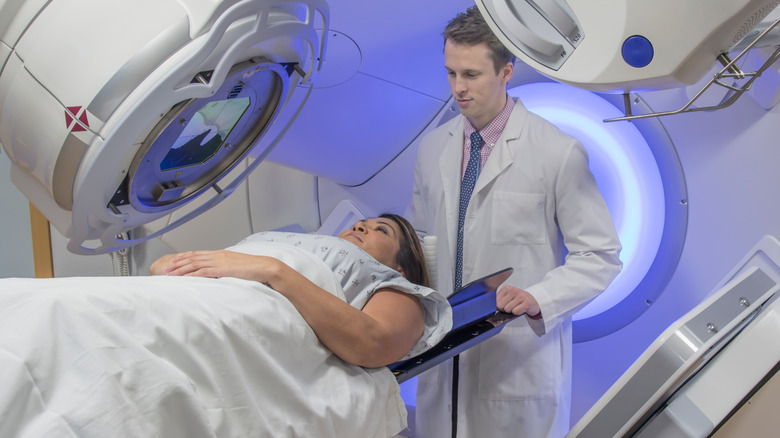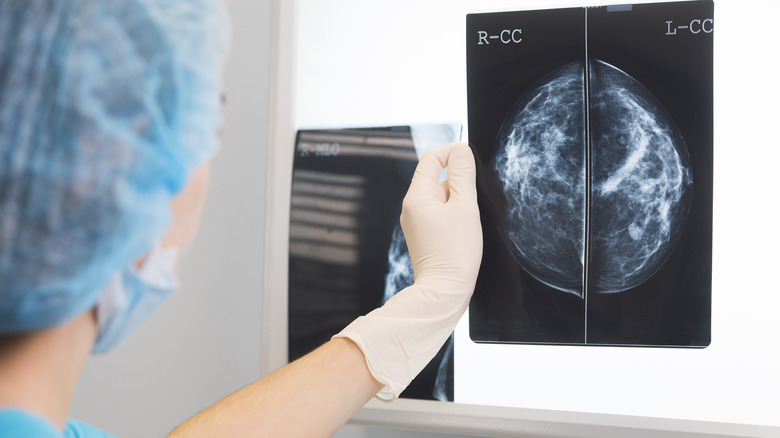Expert Advice On What Questions To Ask Your Doctor While Selecting A Treatment Plan For Breast Cancer
When deciding on a breast cancer treatment plan, naturally many questions will come up for the patient throughout the process. In an exclusive interview with Health Digest, Dr. Ahmed Akl, director of radiation oncology at HCA Florida Mercy Hospital, outlines the specific questions an individual will want to ask depending on whether they're working with a surgical oncologist, radiation oncologist, or medical oncologist.
Once a mass has been confirmed as cancerous through a biopsy, Dr. Akl explains that the patient will then consult with an expert. If meeting with a surgical oncologist, he says the patient will want to start off by asking whether a lumpectomy or a mastectomy procedure may be more appropriate. "The surgeon will present the option of a lumpectomy (removing the tumor) or mastectomy (removing the entire breast), plus sentinel lymph node biopsy," Dr. Akl states. He explains that the size of the tumor will factor into this decision. "[A] lumpectomy is done for tumors less than 5cm. [A] mastectomy is done for tumors larger than 5cm."
"For patients with a very small breast and with [a] large tumor, [a] mastectomy is an alternative option to [a] lumpectomy," Dr. Akl explains. He adds that patients who undergo a mastectomy can also opt for breast reconstruction surgery after the fact. "Whether [a] patient undergoes [a] lumpectomy or mastectomy, the chances of cure are the same," he says. "However, patient who undergoes a lumpectomy needs postoperative radiation to the breast. Lumpectomy and radiation is equal to a mastectomy."
Questions for your medical oncologist, and the role of a radiation oncologist
When meeting with your medical oncologist, Dr. Akl says that the most important question to ask is what kind of therapy is best for you to undergo. "The medical oncologist will speak to the patient about hormonal therapy, chemotherapy, and/or immunotherapy, based on the stage of cancer, hormonal receptor status, and molecular studies," Dr. Akl explains.
Alternatively, the radiation oncologist will focus exclusively on post-operative radiation care and in what cases it will be required. Dr. Akl explains that this will be necessary for patients who undergo a lumpectomy, mastectomy patients with tumors that exceed 5cm, or those with lymph nodes that have tested positive for metastatic cancer.
"Post lumpectomy radiation could be given to the whole breast (usually 16 treatments over 16 days, 1 treatment per day, [and an additional] 4 treatments to [the] location in the [breast] where the tumor was present)," Dr. Akl explains. "For tumors less than 2.5cm and lymph node[s] negative in patients age[d] above 40 years, an option is to do partial breast radiation, meaning radiation only to the area where the tumor was present, by delivering only 5 treatments, 1 treatment every other day for 5 treatments," he states. "Post mastectomy radiation is usually given over 5 weeks (5 treatments per week to a total 25 treatments)."
Some of the hardest questions to ask about breast cancer treatment plans
Dr. Akl goes on to tell Health Digest which topics can be tough for patients to ask about when it comes to breast cancer treatment options. When talking to a surgical oncologist, he explains some of the hardest questions often center on the potential positive or negative outcomes of either a lumpectomy or a mastectomy. "Understand the advantages and disadvantages of each approach, potential side effects, and the chance of complications and chance of tumor control that the procedure is offering," Dr. Akl states.
When speaking to a medical oncologist, questions about survival rates are often some of the hardest for patients to ask about, according to Dr. Akl. "Discuss options of systemic therapy, the benefit of treatment in terms of survival (chance of cure, prolongation of cancer relapse with the proposed medical treatment, as well as the potential side effects)," Dr. Akl suggests. He goes on to state that radiation oncologists are often posed similar questions. "Discuss the options of radiation treatment and [have the doctor] explain [a] proposed radiation plan. What are the benefits in terms of local control of cancer and survival, and early and delayed side effects of radiation."
How patients are prepared for treatment
Dr. Akl explains that a surgical oncologist will prep a patient for surgery by running a series of tests. "Prior to surgical treatment, patients need to be staged with imaging, [as well as] hematological and chemistry blood work to rule out the spread of cancer," he says. Afterward, the patient will be ready for surgery.
A medical oncologist will also issue various tests prior to treatment. "Based on complete staging work-up, hormone receptor status, molecular studies, and genetic studies for high-risk patients, the medical oncologist will decide what treatment the patient will undergo," Dr. Akl states. "Patients need cardiac studies to ensure adequate function of the heart, and need port insertion in major veins to make delivery of chemotherapy easy."
For radiation therapy, patients will undergo a step-by-step treatment simulation beforehand. "After detailed explanation on the process of planning radiation treatment [that covers] simulation, computer planning, or blueprint of radiation inside patient, and delivery of daily radiation including measurements for accurate daily delivery, patients need to undergo simulation of the treatment area in [the] treatment position usually using a dedicated CT scan [in] the desired area to be scanned," Dr. Akl explains. He states that patients are first positioned on a breast board. The oncologist may then utilize a pinpoint tattoo as an initial set-up point to ensure the accuracy of each day's set-up. Finally, patients will remain in the treatment position for a few seconds inside the unit before radiation treatment is issued.




